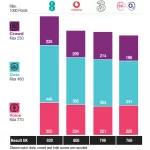Ofcom Study Finds Faster Broadband Speeds Can Boost UK GDP
A new study, which examined the economic impact of broadband connectivity among 35 OECD countries between 2002 to 2016, has found that a rise in broadband adoption and speeds over the period led to an increase in UK GDP of 0.47% per annum on average (cumulative total of 6.7% over the period).
Most people can agree that there is at least a clear causal link between rising adoption of broadband connectivity and positive economic growth via the Gross Domestic Product (GDP) of a country. Indeed various studies have shown something similar in the past, although producing an accurate model is perilously difficult due to the many complex factors involved with how people use the internet.
On top of that a far greater challenge crops up when attempting to identify an economic gain from the impact of faster broadband speeds, such as with the huge challenge of reliably figuring out what kind of positive economic impact a Gigabit capable “full fibre” (FTTH/P) ISP network might deliver versus existing “superfast broadband” (30Mbps+) networks. From an economic perspective they can already deliver many of the same things and the biggest difference is time, although time is money too.
Advertisement
For example, a recent but highly questionable study conducted by economic consultancy Regeneris, which was commissioned by Cityfibre, predicted that the total UK economic impact of deploying “full fibre” (FTTP/H) ultrafast broadband ISP networks, across 100 distinct cities and towns, could reach £120bn over a 15 year period (here). But that study admitted it was “difficult to predict the exact scale of these effects and project the associated benefits into the future.”
The New Study
Back in 2009 Ofcom asked Dr Pantelis Koutroumpis of Oxford University to study the problem and he established that there was “evidence of a causal, positive relationship between broadband investment and growth (i.e. that investment in broadband caused economic growth).” Sadly this data is now out of date and so the regulator asked Pantelis to update his work and to incorporate broadband speed into the analysis.
Ofcom Statement
The work carried out by Dr Koutroumpis on behalf of Ofcom suggests that investment in broadband has had significant benefits to the UK economy. He analysed 35 OECD countries over a 15-year period (2002-2016) and his findings confirmed a positive relationship between broadband investment and economic growth.
He found that the increase in broadband adoption over the 15 year period led to an increase in GDP of 0.3% per annum on average across the 35 OECD countries. For the UK, the increase in GDP was 0.37% per annum, which meant a cumulative increase of around 5.3% over the period.
In addition, the paper also found a strong positive relationship between broadband speed and economic growth. The contribution of broadband speed improvements to UK GDP was higher than the average for the OECD: the UK’s average increase of around 0.1% per annum over the period compares with the OECD average of around 0.08% per annum.
Taken together, the impact on UK GDP of broadband investment and speed improvements was on average 0.47% per annum. The cumulative total was an addition of around 6.7% to UK GDP as a result of improvements in broadband networks over the period.
The new research doesn’t really attempt to answer the superfast vs gigabit impact question (i.e. it’s backward looking and not a predictor of the future), although it does look at the economic gain that resulted from a much smaller increase in speeds over the 15 year period.

Advertisement
Crucially the study notes that there are diminishing returns from faster speeds, which is something that we’ve long suspected might be the case due to the nature of internet connectivity and content (e.g. from the perspective of using a bank or shopping website, 1Mbps isn’t much different to 100Mbps when judging the economic impact of that specific activity).
Similarly the study found that increasing adoption from 10 to 20 connections per 100 people had a greater impact on GDP compared to an increase from 20 to 30 connections per 100 people. Likewise increasing speeds experienced the same issue (e.g. an increase in speed from 1Mbps to 2Mbps would have had a greater impact than an increase of 2Mbps to 3Mbps).
However, the study said there is evidence that the speed threshold at which the GDP effects start to tail off is increasing over time as new technologies emerge that can exploit greater speeds. The overarching message given by the research appears to be that “there will continue to be economic benefits from broadband investment to the UK in the future, in terms of availability, take-up and speed.”
The Economic Impact of Broadband 2018 (PDF)
https://www.ofcom.org.uk/../economic-broadband-oecd-countries.pdf
Mark is a professional technology writer, IT consultant and computer engineer from Dorset (England), he also founded ISPreview in 1999 and enjoys analysing the latest telecoms and broadband developments. Find me on X (Twitter), Mastodon, Facebook, BlueSky, Threads.net and Linkedin.
« Broadband ISPs Shortlisted for the Connected Britain Awards 2018


















































Comments are closed